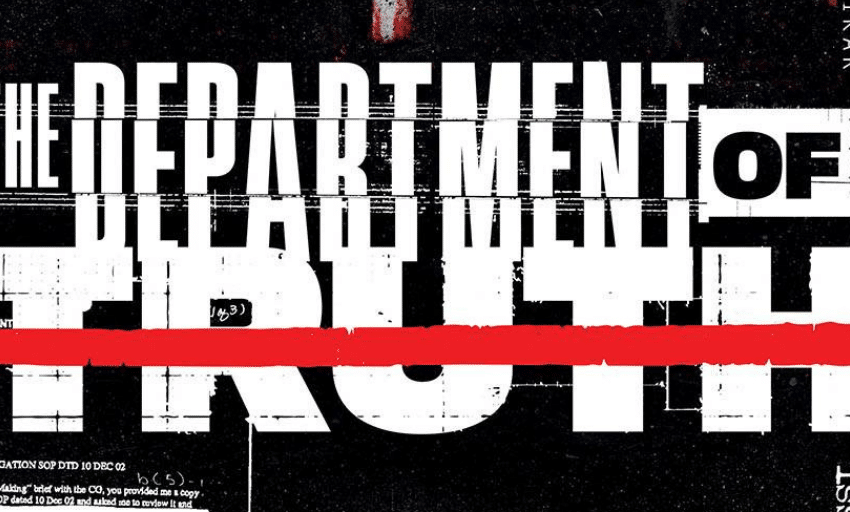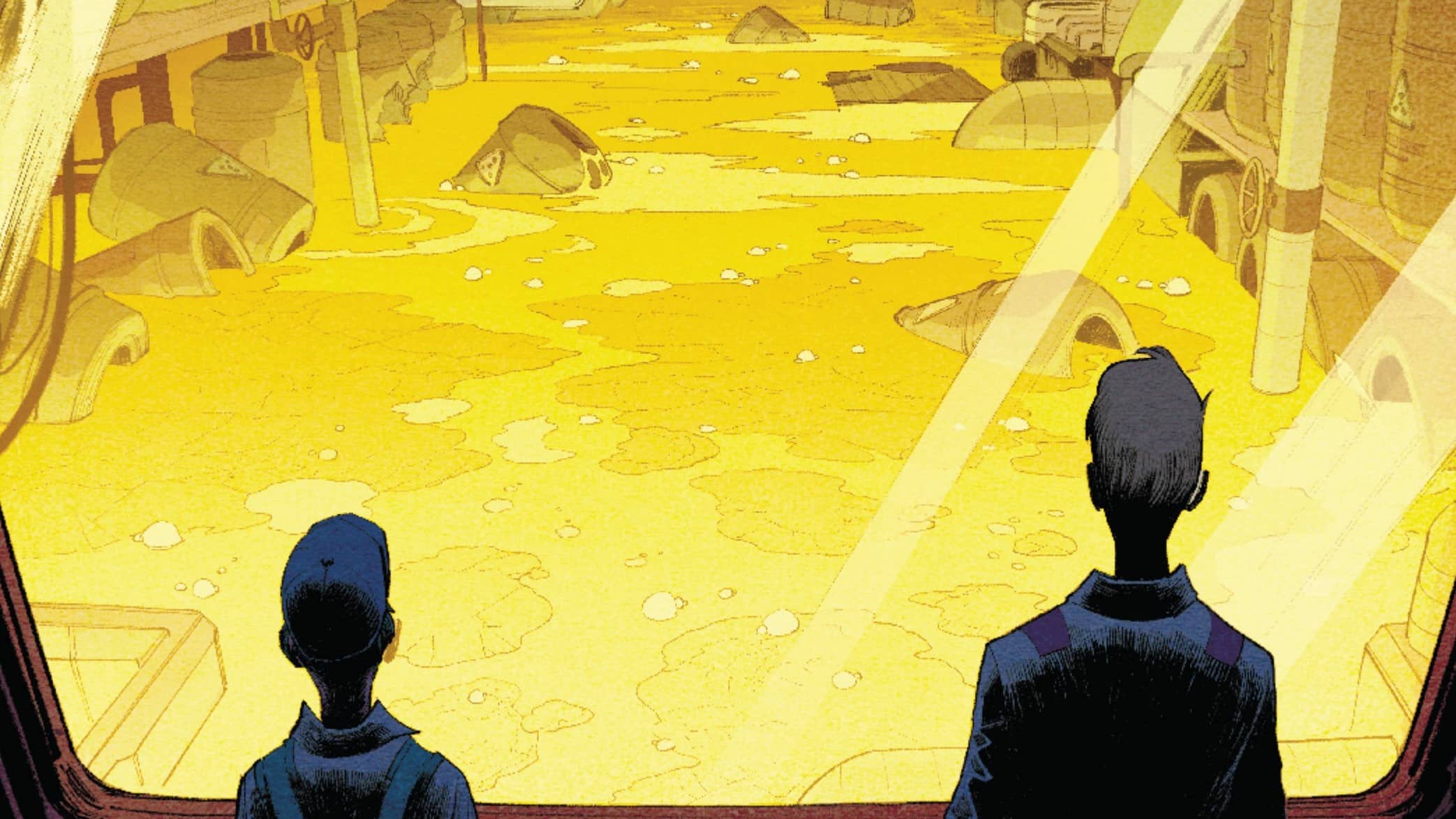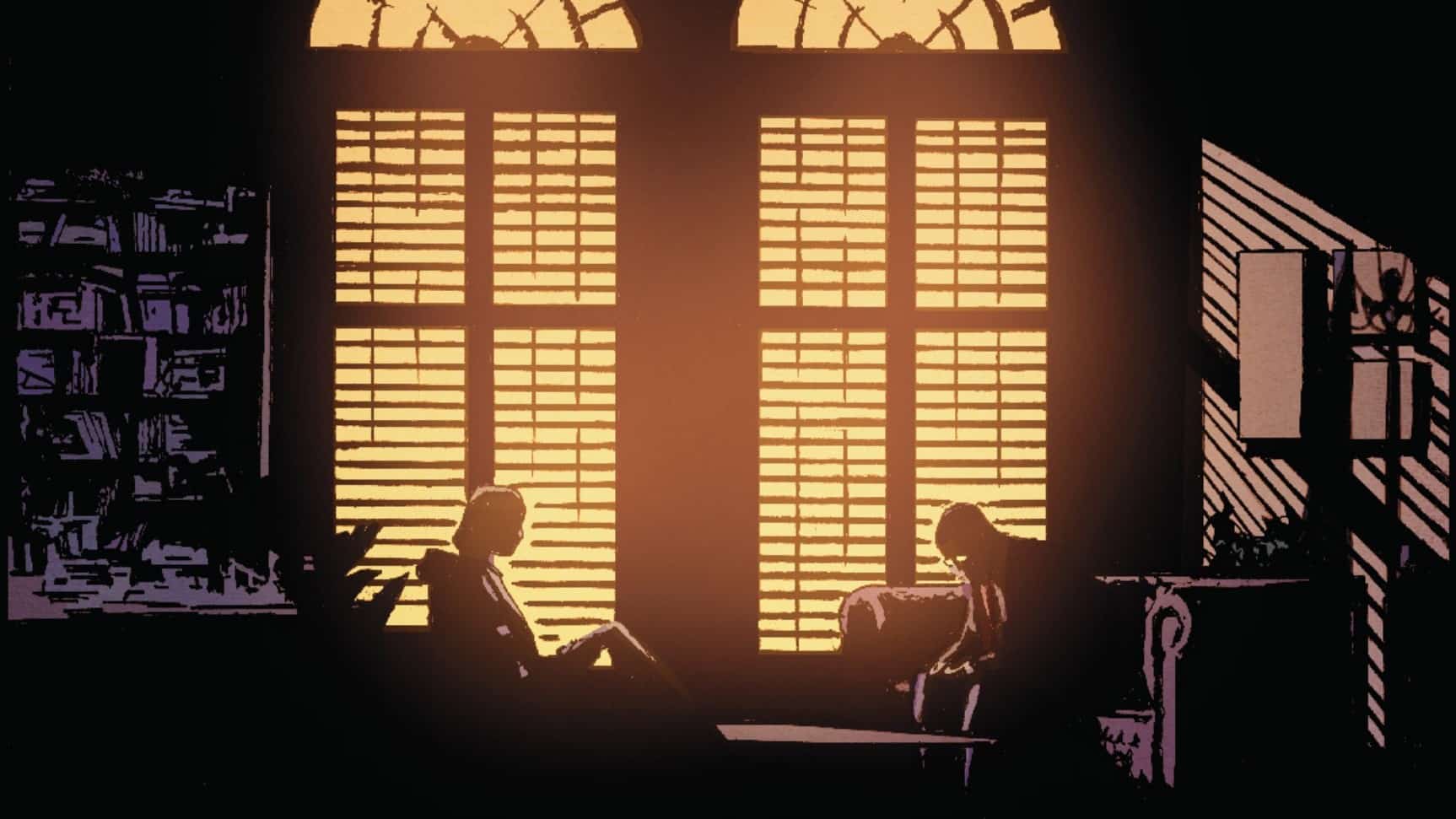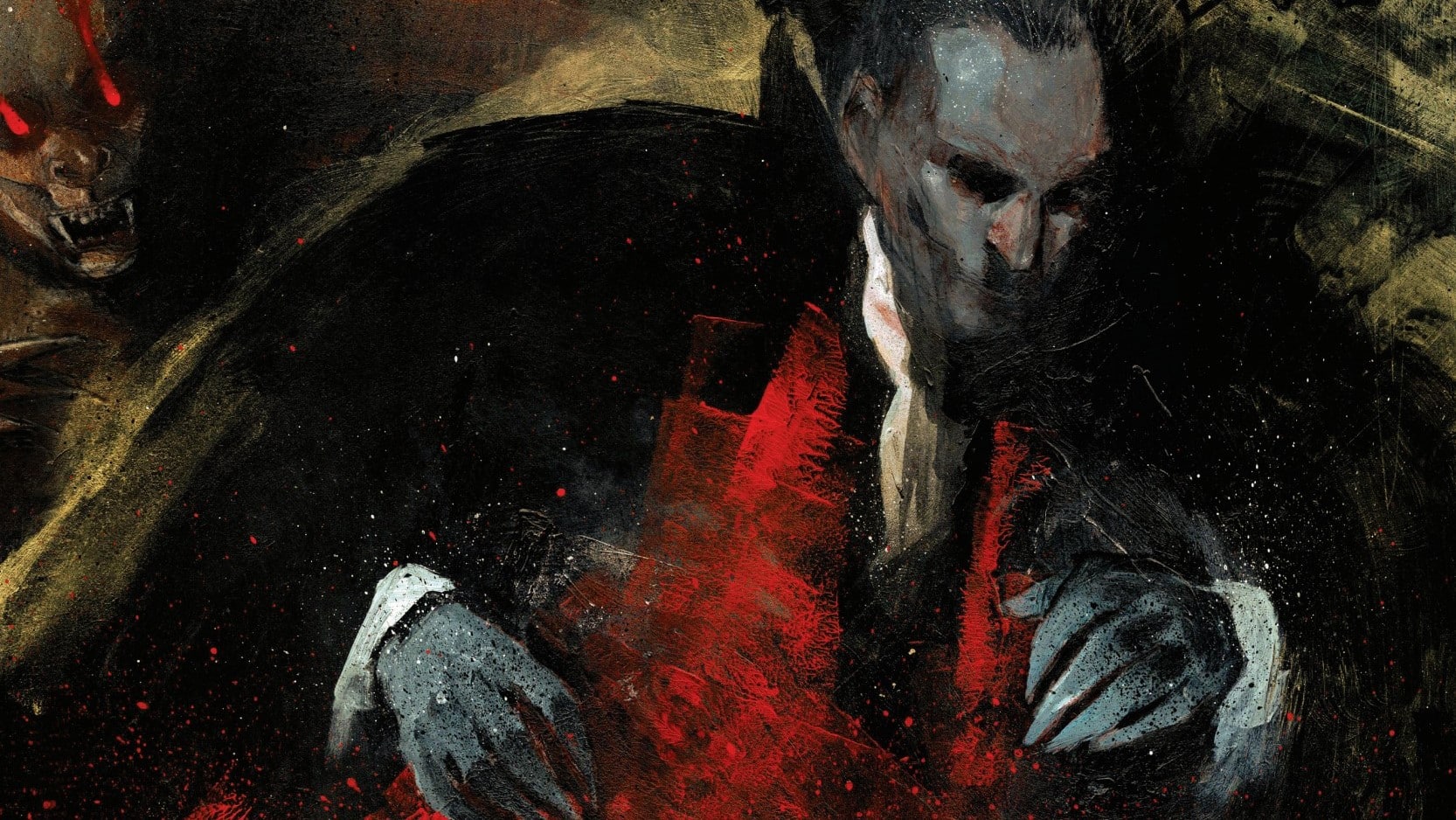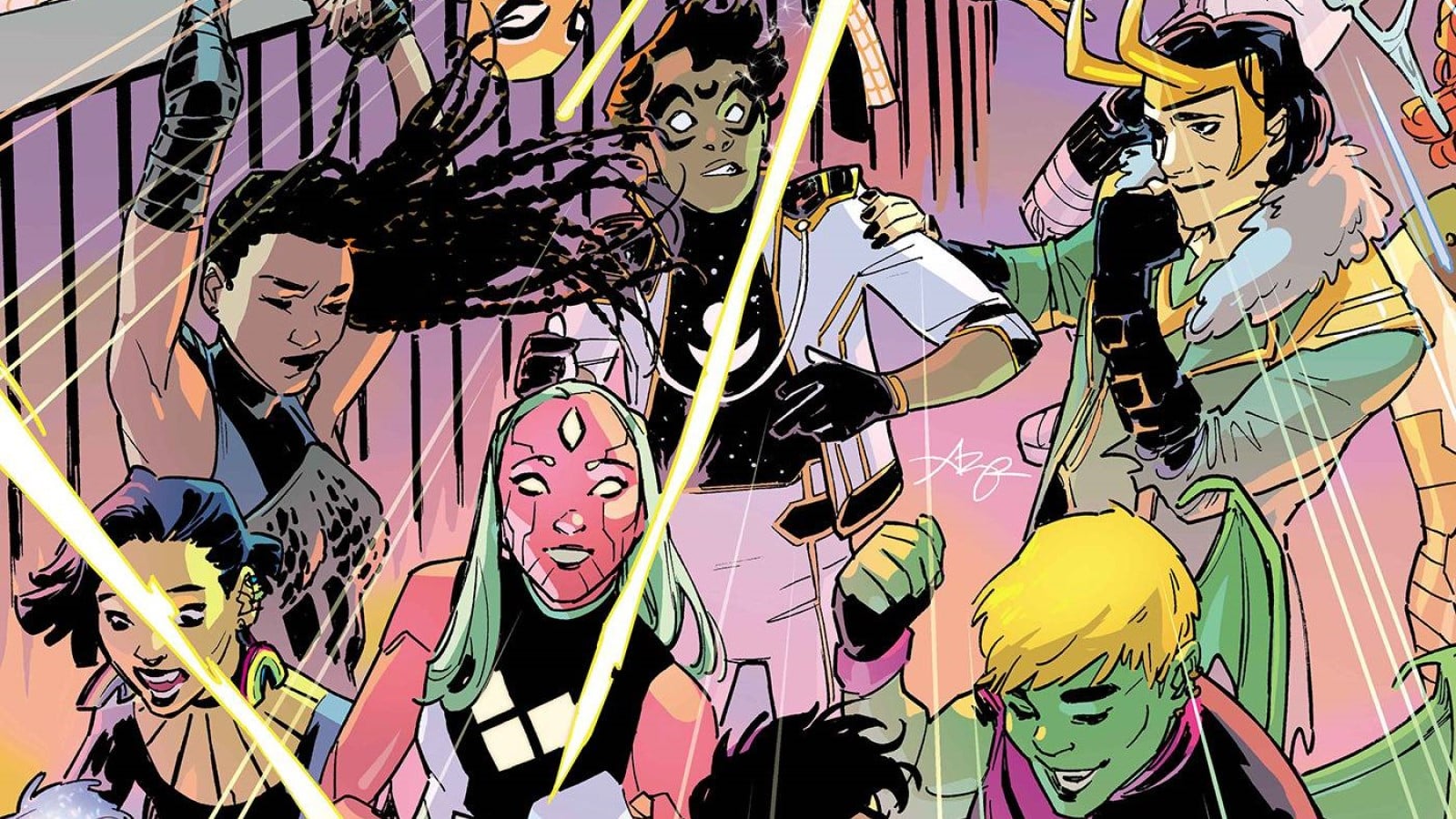What is Black Hat? Who is the mysterious man pulling its strings? Why is he in Cole Turner’s apartment? Cole questions whether he’s on the right side of the War for the Truth in The Department of Truth #5 by James Tynion IV, Martin Simmonds, Aditya Bidikar, Dylan Todd and Steve Foxe.
Will Nevin: While I could be wrong — and that is always a very real possibility — it seems like we’ve come to the end of the first main story arc for Department of Truth with two lore issues to follow this one before we pick up with the second arc in #8. Vishal, how are you feeling about where we are and where we seem to be going in the series?
Vishal Gullapalli: I think you’re totally right, Will, this is the end of the first arc. It’s a really strong ending to the first arc, too — taking a lot of the threads opened up throughout the first four issues and not exactly tying them up but holding them close enough together that you can see part of what they’re forming. The information we’ve gotten here has further solidified my faith and trust in this creative team to properly deliver on the story they’re telling, that’s for sure.
WN: And Forrest, what about you?
Forrest Hollingsworth: There’s secrets in those Denver Airport tunnels, and I’m gonna find them! I’m gonna gobble up all the clues!
WN: As we’ve learned, Forrest, you only have to do the research, and you’ll find whatever it is you’re looking for. Now, let’s see what Cole Turner is thinking.
The Last (?) Temptation of Cole Turner

WN: Outside of a brief flash to Denver International Airport, we pick up the action with Cole Turner as he’s struggling to cope with murdering two journalists to keep the secret of our malleable, democratic concept of reality. And if that wasn’t bad enough, he’s got Martin Barker, the lead Black Hatter, waiting for him in his apartment. The whole scene — this attempt to tell Cole the *real* truth behind the truth he’s only now discovering — is some gripping stuff. Friends, what did you think?
FH: First off, I’d like to commend the shift in visual tonality that the book takes here. The previous issue was honed in on voyeurism in a way — spies spying on each other through hidden cameras and backroom monitors — but as the narrative focuses in on the personal tragedy Cole is experiencing here, it becomes more noir-like. He stands in the rain on the phone with his partner, a stray streetlight beam illuminating him before he ascends the darkly atmospheric stairs to his dingy apartment — a more immediate reflection of Turner’s internal struggle and unease that I deeply appreciate. Simmonds is putting in the work!
In any event, there’s a lot to unpack here, but the primary takeaway for me was the myriad of real world forces Tynion is successfully using Black Hat as a kind of cipher for. Barker’s assertion that there’s no culpability in providing a platform for “things people already believe” is not that removed from positions that Facebook and Twitter have defended in the past, with observable and not insignificant impacts on elections, finance, public protest and safety and just about everything else.
WN: A book for our times, isn’t it? This is a real quote from one of Georgia Rep. Marjorie Taylor Greene’s supporters: “Noah was a conspiracy theorist himself when he built the ark. So who are we to say that it’s true or not?” This issue couldn’t be more timely.
VG: I gotta say, I loved the way Barker used Cole’s own struggle with what he’d just done (really didn’t expect this issue to take place so soon after the previous one ended) to sow the seeds of doubt in his mind. There was a specific line that stuck out to me: “How many people have I hurt since you joined the Department?” Beyond the premise of altering reality, this struck very close to home because so many agitators and public figures take zero responsibility for what they incite, claiming that since they personally haven’t directly harmed anyone they’re truly innocent. We had an armed insurrection in the Capitol earlier this month, incited by the now-former president. He and his supporters use the same tactic, claiming they personally didn’t do anything wrong. While it’s obviously a frustrating reality, I love how frustrating realities can be pointed out and poked at in this book. Tynion clearly knows this guy’s peddling bullshit, and makes sure the audience doesn’t even entertain that kind of defense.
FH: The book opens with evidence that Black Hat did hurt people, too. We’re meant to connect the dots that Barker is fundamentally untrustworthy but in a way that demands work from Cole (satisfying answers are convenient, but reality is messier) and from the readers themselves, something I think we’ve all appreciated about the book from the beginning.
What’s It Matter? It’s Just Reality

WN: Another thing I loved in the apartment scene is the line in which Barker says of conspiracy theorists, “Why don’t they have the right to believe what they want to believe?” In a series that’s already shown its willingness to “go there” with addressing QAnon, I thought that cut right to the meat of our problems in 2021 with conspiracy theorists like Greene now members of Congress and a political discourse becoming ever more untethered from objective reality. Really an incredible line to ponder.
VG: I think my favorite part here was what we learned about the origins of the Department of Truth, because it fits so well both in the world of the book and as a commentary on the world we reside in. The idea that the Department of Truth was created as an ultrapowerful propaganda machine for the postwar United States is so immediately striking to me, because that’s still an era whose propaganda is actively damaging the world today. So many people are unwilling to hear anything but “Communism is evil” and “America has been the most important country in the world since D-Day,” and that’s in no small part due to the absurd international propaganda machine the USA has become. The Department of Truth fits uncomfortably well into that reality, and that discomfort is a good thing.
FH: Vishal is right, and we get closer and closer to that Das Kapital piece I mentioned last column that would make me happier than talking about any of the other real world problems that happened this month alone — but I digress.
Barker forwards the idea that much like the push-and-pull between socio-political powers (he evokes the USSR, Christianity, Masonry, among others) happening on a global scale, he sees Black Hat as the natural response to the Department, a moralistic thumb on the scale. It’s an interesting, I think important, insight into the mentality between the opposing forces, and all the best villains have reasons for what they’re doing, right? There’s an added narrative value and implication to it that I really appreciate, especially as a note to leave this arc on.
An Eye for An Eye, A Truth for a Truth

- Denver International Airport, unlike QAnon, is a fun and (mostly) harmless conspiracy theory that says the Illuminati built this nefarious home for government plots but left all sorts of clues in murals and other random things for people to discover. Conspiratorial thinking is weird.
- As should be expected with most conspiracy theories, however, repitilian/lizard people thinking is deeply, irrevocably rooted in anti-semitism.
- When we return to the scene of Cole’s crime, only chalk outlines of the bodies remain, a deft kind of revisionism the Department clearly trades in, and one that continues the idea of pursuing symbols and suggestions of other things.
- The Star Faced Man’s remark about recently attending a “pizza party” is a stomach- churning reminder of conspiratorial focuses on hurting children, something this panel of truth-seekers discussed in our first column.

